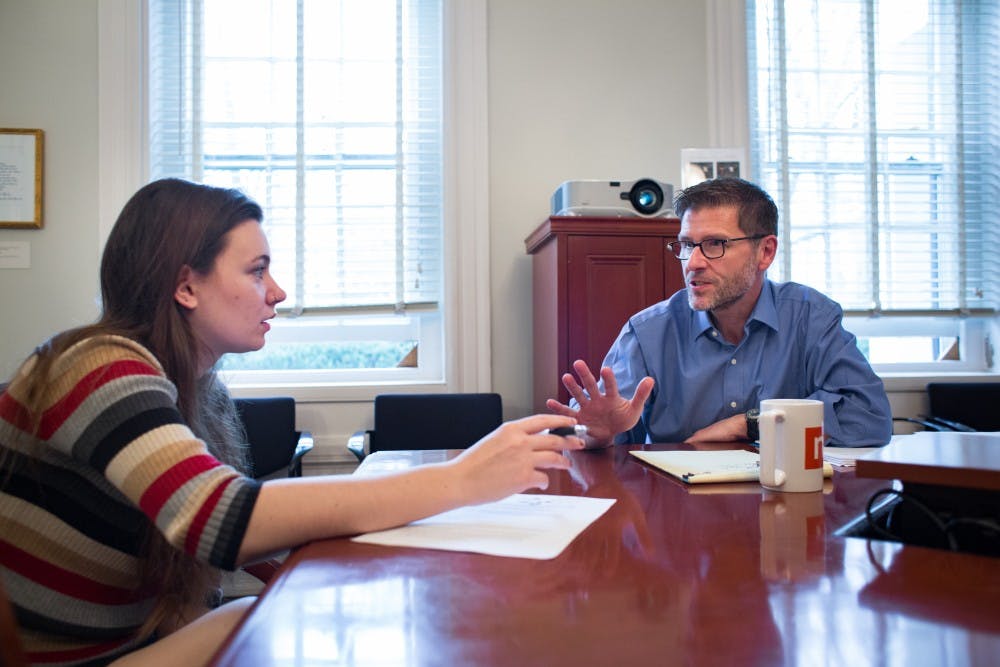Journalism classes have been taught at the University for more than 50 years. Students have always loved the classes — they usually fill up within minutes of the beginning of course selection — but they wanted more. On Monday, they finally got their wish.
After years of conversation, planning, advocacy, and hard work, the plan for a journalism certificate finally materialized. The University faculty voted unanimously to approve the certificate. It will be open to students during the 2018–19 academic year on an application basis.
Joe Stephens, the Edwin F. Ferris Professor in Residence and award-winning investigative journalist, has been one of the key figures shaping the program.
“At a time when journalism is under assault in a lot of areas in society, it’s great to see this university — the students, the faculty, the administration — all come together and say this is important for society,” Stephens said. “We need a way to find out verified facts. We need ethical, reliable journalism.”
And teaching reliable journalism is just what the program will seek to accomplish. The journalism certificate will have three elements of requirements, including coursework, substantial field experience, and a required colloquium during the senior year. The five courses must consist of at least one “gateway course” or a JRN 200-level class, at least two upper-level seminars, and at least two additional journalism-related courses, which can be any course listed, cross-listed, or approved.
University journalism courses began in 1957, and have since consisted almost exclusively as Ferris Seminars, or 400-level intensive writing courses. The classes are exceedingly popular. According to data from the University registrar, 1,498 students have enrolled in 123 journalism courses, with overall enrollment increasing 35 percent since 2007.
This upcoming academic year, the University will bring in 10 visiting professors and lead several reporting trips domestically and abroad as part of the classes.
Newby Parton ’18 has taken four journalism classes and previously worked as an opinion editor for The Daily Princetonian. Although Parton is pleased that the certificate has passed, he wishes that he could have pursued the certificate program during his time at the University, he said.

“We have an extraordinary line-up of professors who are journalists, and they teach extraordinary courses,” Parton said.
Stephens, who has made his career in journalism, spoke to the importance of having an academic experience in journalism early on.
“After I took my first journalism class, it was like I was a whole new person. It was like my whole world just kind of came together,” Stephens said. “It’s, you know, it was like walking or breathing. Everything that was hard became easy. I couldn’t imagine doing anything else.”
According to the proposal from the Humanities Council, under which the Journalism Certificate Program will be housed, the goals of the program are four-fold. Students who receive the certificate will need to demonstrate critical media literacy, taking courses such as Stephens’s class JRN 445: Investigative Journalism. They will also be able to practice writing and the art of storytelling through more stylistic courses, such as professor John McPhee’s JRN 240: Creative Nonfiction. Additionally, the program will highlight public service and global citizenship and digital entrepreneurship.

Kathleen Crown, executive director of the Humanities Council at the University, said she has listened to students pushing for the certificate program since she started at the Council five years ago. Crown explained that the program is not simply a badge.
The certificate will serve as “a connective tissue and make the students aware of each other and of themselves as a community on a similar path,” Crown said. “This is a vocation and a craft that is needed now more than ever. It’s a critical time for journalism and Princeton has a role to play.”
Crown is a member of the ‘Prince’ Board of Trustees.
One of the unique aspects of the program is its ability to attract students from across disciplines at the University. In an effort to maintain diversity of interest areas in the program, the certificate will not have an independent work requirement. Students will instead engage in a separate colloquium during the senior year.
“We strongly believe that journalism needs a disciplinary foundation, that students will have a liberal arts education and solid grounding in a discipline, whatever it is, and that is what will serve students best who want to go on and pursue journalism,” Crown said.
The Ferris Seminars have brought an outstanding group of visiting professors to the University over the years, including David Remnick ’81, now top editor of The New Yorker; Jill Abramson, past executive editor of The New York Times; and Washington Post Senior Editor Marc Fisher ’80.
Edward Wong, former Beijing Bureau Chief at the Times and one of the program’s visiting professors last year, expressed support for the certificate program.
“Princeton students are among the citizens who will renew and reinvent journalism at this critical time,” Wong said. “The certificate program will give students rigorous practical training while grounding them in principles, ethics and history. I can’t imagine a better way to bolster democracy and civil society.”
Sophia Cai ’21, a member of the University Press Club, is currently enrolled in her second journalism course and expressed interest in pursuing the certificate here. Cai said she would have taken just as many journalism courses without the certificate program, but she is still happy about the news.
“Journalism becoming a certificate validates the work that these students are doing,” Cai said.
“Students are already leading the way,” Crown added. “They’ve done the work; we want to recognize the work that they’re doing.”
The certificate will be open to rising juniors and seniors during the 2018–19 academic year.








